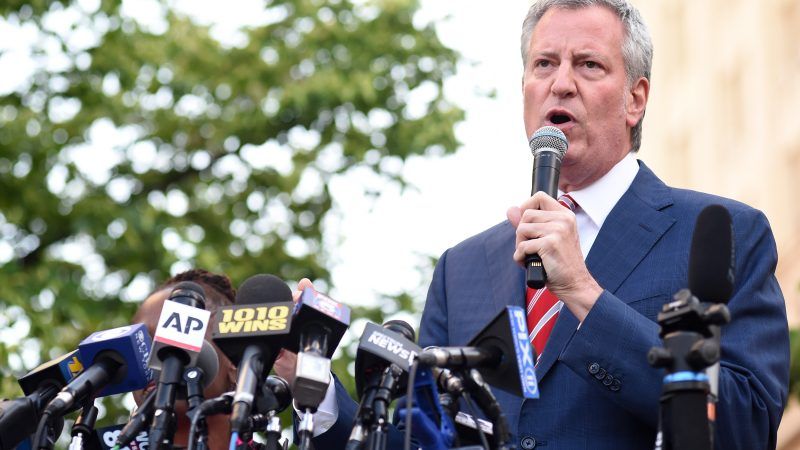Widely Unpopular Bill de Blasio Leads Major Crackdown on Highly Popular Ice Cream Trucks Over Unpaid Parking Tickets
New York's parking regulations make numerous traffic tickets just another cost of doing business for the city's food trucks.

New York City Mayor Bill de Blasio has a lot on his plate right now, having to both run the government of the country's largest city while also campaigning for the country's highest office. Neither responsibility, however, has interfered with the Democratic presidential candidate's ability to execute a major crackdown on ice cream trucks.
On Wednesday, New York launched Operation Meltdown, seizing 34 ice cream trucks and filing a lawsuit against their owners alleging that they engaged in a fraudulent corporate shell game to avoid paying millions in traffic and parking fines. Another 12 targeted ice cream trucks escaped the sweep and are currently being hunted down.
"No New Yorker is above the law—especially those who try to ignore public safety laws," said de Blasio in a Wednesday press release. "This seizure marks the end of the road for these scofflaw ice cream vendors."
The city's lawsuit targets six ice cream vendors who, between them, own and operate a fleet of 76 trucks. Together, these trucks racked up some 22,495 traffic violations between 2009 and 2017, resulting in $4.5 million in unpaid fines. The city is only going after the 46 trucks that racked up more than $10,000 in fines. A few of these trucks had unpaid fines in excess of $100,000, according to the city's lawsuit.
In its complaint, filed Wednesday, the city alleges that the ice cream truck owners played an elaborate game of corporate hot potato. After earning a sufficient number of traffic tickets, a truck would be transferred from one dummy corporation to another (all of which have names like Twirly Twirl Ice Inc. or Minus Below Inc.) in an alleged attempt at foil city debt collectors.
"The collection division of the Department of Finance attempted to collect this debt through traditional means of demand notices and information subpoenas to banks, but was unsuccessful," reads the city's press release. "The Department found the debtors never had bank accounts, and any trace information to the corporate defendants no longer existed by the time the Department attempted to reach them."
In addition to the alleged fraud, the city argues these "scofflaw ice cream vendors" are also a danger to public safety.
"Defendants' trucks create dangerous situations and disrupt City traffic flow by stopping, standing, or parking in crosswalks (846 violations) or adjacent to fire hydrants (1,192 violations); defendants' trucks ignore red lights (93 violations), and block access to pedestrian ramps (63 violations)," reads the city's complaint. Those instances represent about 10 percent of the traffic tickets these trucks are said to have accumulated.
City law currently bans selling merchandise—including food—from metered parking spaces. Since virtually every parking space in the city is now metered, tickets for that offense have become a routine cost of doing business, says Ben Goldberg, CEO of the New York Food Truck Association (NYFTA), a business group.
Food trucks "have to legally get tickets in a way because there are no locations in New York that are good that are not metered. The trucks understand that it's just a cost of doing business," Goldberg tells Reason while stressing that NYFTA members are required to pay any parking tickets they receive.
The constant fines are a major burden on vendors. Goldberg says that any food truck business that is looking to expand or grow their operations has to look away from servicing city streets and focus on working special events where parking isn't an issue.
In this context, the city's ice cream raids seem to have less to do with public safety, and more to do with enforcing outdated parking regulations that bedevil all mobile food vendors.
Many of the workers of these ice cream trucks are certainly no better off after yesterday's seizures.
"This is not good. I'm trying to make some money. I got a family, I have to support them," one driver said to the New York Post.
"I'm just angry because I'm not going to have a good summer. I work seven days a week for three months (in the summer). In the winter I'm going back to college…Now all my plans have changed," another driver told the Post.
That's not to say that the defendants are noble victims. Provided the city's claims are true, they've engaged in blatant fraud.
They have also potentially been screwing over their workers. One ice cream truck worker affected by the truck seizures told the Post that he'd been assured the tickets he'd accrued were being paid and that his wages were garnished to cover the fines.
Goldberg says that regardless of vendors' frustrations with the current regulations, the best way the food truck industry can affect change is through normal, perfectly legal lobbying.
I think that's right. Nevertheless, one can't ignore the role that existing parking regulations play in incentivizing some bad actors in a tight market to color outside the lines.
Rent Free is a weekly newsletter from Christian Britschgi on urbanism and the fight for less regulation, more housing, more property rights, and more freedom in America's cities.

Show Comments (42)